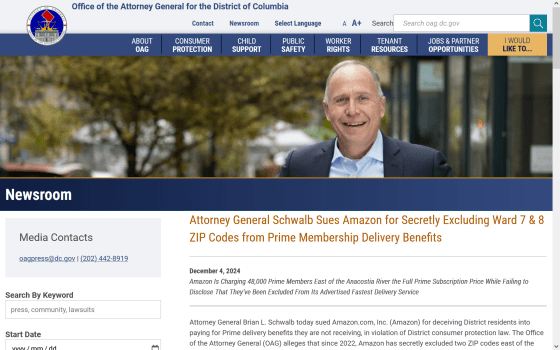Amazon sued for not delivering to Prime members in low-income areas as quickly as possible and for concealing the facts

Amazon was sued by Brian L. Schwalb, Attorney General for the District of Columbia, for secretly excluding certain areas from its fastest delivery service for paying customers. The areas in question are known to be predominantly black and low-income areas.
Attorney General Schwalb Sues Amazon for Secretly Excluding Ward 7 & 8 ZIP Codes from Prime Membership Delivery Benefits

Amazon sued by DC AG over slow deliveries in low-income areas
DC alleges Amazon is cheating some Prime users • The Register
https://www.theregister.com/2024/12/04/washington_dc_amazon_prime/
Amazon offers a flat-rate service called 'Amazon Prime' that provides subscribers with the fastest delivery service possible.
According to Schwalb, Amazon intentionally excluded some areas of Washington DC (zip codes 20019 and 20020) from its fastest delivery service starting in June 2022. Furthermore, Amazon allegedly did not inform customers that the exclusion would significantly slow down delivery to those areas.
According to documents provided by the District of Columbia Attorney General's Office, in 2021, before Amazon made the change, the percentage of packages delivered within two days was approximately 70% across the region, and up to 72% in one of the affected regions, zip code 20019. However, after the change in 2022, deliveries were clearly significantly delayed only in that region, and in 2023, the percentage of packages delivered within two days dropped to about 25%.

The areas excluded are in Districts 7 and 8 of Washington, D.C., which have historically had high low-income and high unemployment rates. The change will affect about 48,000 residents.
Residents noticed the delays in deliveries and complained to Amazon, but Schwalb claims that Amazon hid the fact that it had removed them from its service area and misled them into thinking it was a coincidence.
'Generally, companies are allowed to make operational changes, but they are required to inform customers of the adverse effects so that they can make informed purchasing decisions,' Schwalb said. While Amazon has the right to change its services, Schwalb said it is not allowed to do so in secret, and filed a lawsuit against Amazon for allegedly violating the Consumer Protection Procedures Act (CPPA).

The local consumer protection law broadly prohibits deceptive and unfair practices, such as misleading consumers, misrepresenting products or services, or withholding important information about those products or services. Schwalb said the company violated the law by making it appear as though it was providing services it did not provide, and then making customers pay for services they did not receive.
In his lawsuit, Schwalb asks Amazon to refrain from further engaging in unfair and deceptive practices and to pay damages to affected residents.
This is not the first time that Amazon has been asked to correct regional disparities. In 2016, it was pointed out that 'neighborhoods with a large black population are about half as likely to be eligible for same-day delivery as those with a large white population.' At that time, it was also criticized by lawmakers, and Amazon promised to provide faster delivery to majority-black neighborhoods.
Related Posts:
in Posted by log1p_kr







